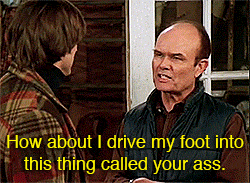I think GenX was told to expect better for themselves and that things were going to just fall in place if you have a degree and career, then life changed almost overnight. Post 9/11, life changed a lot. Our sense of self changed. Options and expectations changed. Life wasn't so simple anymore. The air around us changed. Our vibe was different. People saw each other differently. We lost a lot of our innocence, hope, and dreams for the future. I think the best song to reflect how being a GenX felt is . . . with all the promises made and how reality knocked us on our heinies

I agree. My personal experience is a little different, but as a whole for our generation your post is spot-on.
It's ironic that the left bang on in vain about a revolution, while the right seems to have them every few decades. I don't know what kind of consequences the current wave of populism will have in the long term, but it seems to confirm the historical pattern... 'progressive values' are advanced gradually in incremental reforms, while conservative values are advanced in reactionary revolutions. It's kind of the opposite pattern that most people expect, but it makes sense.
I notice this, too.
I notice that decades-old anarch punk slogans and ideas have been stolen by the alt-right. The slogans are often verbatim, while the ideas are twisted for a new agenda. It can be bizarre to debate with someone who throws punk rock lyrics and cliches at me like they are "new ideas", but from the opposite point of view. I don't think it is coincidence. The right is good at revolution. Conservatives are better "team players". Steal the slogans and ideas, twist them to suit your needs, and feed them to the team, while the left, an omnium gatherum, continues to argue amongst themselves.
I believe the best way to make a subculture less threatening, too, is to popularize it among the masses. Making the music, clothing, etc, popular, so regular citizens are partaking in some version of it, makes it more difficult for people within the subculture to tell who their allies are, turns the ideas into cliches so nobody takes the ideas seriously, and causes in-fighting because people are more focused on the authenticity of people within the subculture than on ideas or action. It happened with beatniks, with hippies, and with punk. I watched it happen in "real time" with punk, and it was interesting. All it takes is cooperation between capitalism, media, and the government, and that relationship is already strong. I could explain what this looked like, and how it happened in detail.
I always thought a lot of the ideas of revolution inside the punk movement were far-fetched, impractical, and idealist. Reading Emma Goldman and belonging to the local ANTIFA doesn't establish the aftermath of "the revolution".
The only place I've seen this work like the anarcho-punks wanted it to work was in Czechoslovakia. I used to know a person who was involved in that revolution, who knew Havel. I interviewed him for a punk zine, and what he said about how music, poetry, and the arts were used as communication devices was extremely interesting. It was effective. The Czech Republic would not be what the anarcho-punks want, though, and that is part of the problem. What the right wants is more concrete. The left can't agree and they're too idealist.



